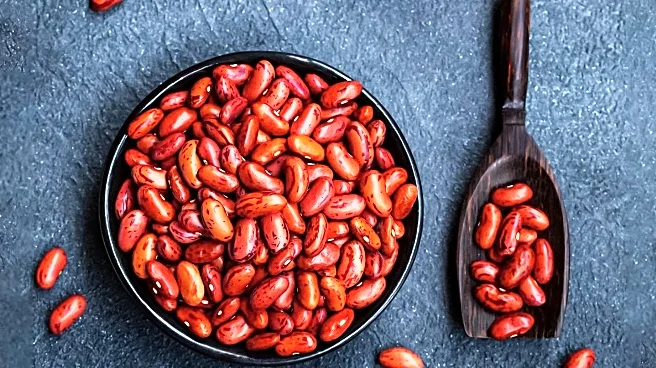What's Happening?
The #BeanTok trend, which encourages consuming two cups of beans daily for improved gut health, is gaining popularity on social media. However, Kirsten Jackson, a dietitian specializing in irritable bowel syndrome (IBS), cautions that this sudden increase
in fiber intake can lead to digestive issues, particularly for individuals with IBS. Beans are rich in fiber and probiotics, but they also contain carbohydrates called galactooligosaccharides, which can be difficult for some people to digest. This can result in symptoms such as gas, abdominal pain, bloating, and loose stools. Jackson advises introducing beans gradually and considering canned varieties, which have lower FODMAP content, to minimize discomfort.
Why It's Important?
The trend highlights the potential risks of adopting dietary changes without proper guidance, especially for individuals with digestive disorders like IBS. While beans offer health benefits, the rapid increase in fiber can disrupt digestive health, underscoring the need for personalized dietary approaches. This situation reflects broader concerns about the influence of social media on health behaviors and the importance of consulting healthcare professionals before making significant dietary changes. The trend could lead to increased demand for dietary advice and products that aid digestion, impacting the nutrition and healthcare industries.
What's Next?
As the #BeanTok trend continues to spread, healthcare professionals may see a rise in patients experiencing digestive issues related to high fiber intake. This could prompt further research into the effects of sudden dietary changes and the development of products or supplements to aid digestion. Social media platforms might also face pressure to regulate health-related content to prevent misinformation. Additionally, there may be increased interest in educational campaigns promoting balanced dietary practices and the importance of consulting dietitians for personalized advice.
Beyond the Headlines
The trend raises ethical questions about the role of influencers in promoting health advice and the potential consequences of unverified health claims. It also highlights the cultural shift towards plant-based diets and the challenges of balancing health benefits with individual digestive tolerances. Long-term, this could influence dietary guidelines and public health strategies, emphasizing the need for evidence-based recommendations and the integration of gut health into broader health initiatives.
















